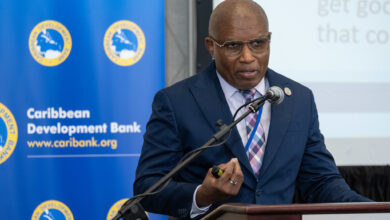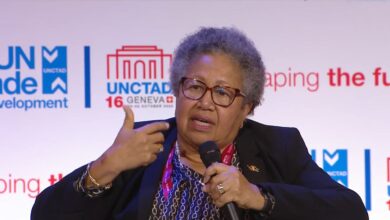I would like to begin these remarks by extending my appreciation to Honourable Prime Minister Douglas for organising this important consultation on Youth Crime and Violence in our society. This issue is central to the investigations being carried out by the Caribbean Commission on Youth Development (CCYD) appointed by the Conference of Heads of Government, which is due to complete its Report later this year.
This initiative by Prime Minister Douglas would also serve to lay the foundation for the wider Summit on Youth being proposed by the President of Suriname, the Lead Head of Government with responsibility for Youth, Sport and Gender. Today, thanks to the vision of Prime Minister Douglas, we will be focusing on “Confronting the Challenge of Youth Violence in Society: Defining a Multi-sectoral response”.
Distinguished Heads of Government, Ladies and gentlemen, there is an urgency for grappling with the upsurge in crime and violence and for arriving at a viable response.
Quite recently, in browsing the daily regional News Briefs prepared by my staff, I was struck by an article which began as follows:
“The St Lucia government has ordered the police to take back the streets following the murder of six persons and an open threat from criminals to assassinate law enforcement officials.
Police have been given the orders to employ a strategy to bring the city and other trouble spots back under control… “We do not want another life lost,” National Security Minister Guy Mayers said in a statement.
“We want people to feel safe that they can walk the streets and not be shot at. Right now criminals are no longer waiting for the cover of darkness, and those involved are often the same age group, teenagers and youngsters in their mid-twenties.
We need to get to the root of why young people feel they need to resort to that kind of activity. Young men are crying out for attention and we are seeing the effect of whatever it is they are going through,” Mayers said.
This Saint Lucia experience is not a unique one. In one form or another and in spite of our best efforts, the Member States of our Community continue to be confronted by awesome challenges from crime and violence. Indeed, violence, crime and the public insecurity which they breed have become persistent social challenges that impact negatively on the economic growth and development of our societies. Therefore, this Conference which is hosted by the Government of St Kitts and Nevis is not only propitious, but it is yet another opportunity for the meeting of minds at the highest levels, to try and find solutions to this persistent social scourge.
Ladies and Gentlemen, that News Report, however, articulated the dilemma which is perhaps common in all our Member States. On the one hand, it points to the threat of violence to the society in general and to law enforcement officials, in particular and on the other hand, it poses the question ‘why do young people [especially men] feel they need to resort to that kind of activity? Is it, as the Minister pointed out, that the young people are crying for attention?’ Is their behaviour really a ‘crie de Coeur – a cry from the heart’?
At its Meeting earlier this month in Montego Bay, Jamaica, the Council for Human and Social Development (COHSOD) considered issues pertinent to Gender and Education and in particular, the issue of Boys’ Under-participation and Under-achievement in the Education System. In its Communiqué, the Meeting acknowledged the complex nature of the issue and made reference to the situations in the wider society and economy which might contribute to the continuing challenge.
That continuing challenge of boys’ under-participation and under-achievement in education may have a direct relation to the issue which we are gathered here to discuss today. Ladies and gentlemen, if truth be told, in our societies, youths have been in gangs since time immemorial but the difference today, is the violent nature of the association with drugs and the access to guns. That factor raises the question of the proliferation of illegal firearms. Firearms are products not manufactured in the Community. It also raises the question of how to effectively reduce access to, as well as, the use and abuse of illicit drugs.
As regards firearms, my personal mantra has always been that “man with gun WILL shoot, man without gun CANNOT shoot – not will not or may not but CANNOT”. This leads me to my third proposition that all effort must be made to avoid the proliferation of guns – not that this is easier said than done but, it is still easier than removing the guns once the phenomenon of proliferation has taken place. Regrettably, for many of our societies, the proliferation has already taken place and so we now face the much more difficult task of how to retrieve the situation as “man with gun WILL shoot!”
As regards this proliferation of firearms and abuse of illicit drugs what should we be doing that we are not doing? In 2001, CARICOM established a Task Force on Crime and Security to examine the fundamental causes of crime and violence in our society. That Task Force submitted its Report which contained more than a hundred recommendations.
We subsequently created a new security architecture, headed by the distinguished Prime Minister of Trinidad and Tobago, Honourable Patrick Manning, to manage our regional crime and security Agenda. The new structure gave the quality of leadership which made the entire Region proud of our security arrangements for Cricket World Cup (CWC) 2007, as well as for the recently concluded Fifth Summit of the Americas (V SOA).
But those were isolated events. What our societies are faced with is an on-going scourge that is decimating our young men at an alarming rate in certain Member States. It may be necessary therefore to revisit the recommendations of the Task Force to glean if any of the recommendations could be applied to this increasingly untenable situation.
But law enforcement is only one aspect of the strategy to eradicate or at least minimize the propensity for our youth to turn to violence. The Secretariat is currently engaged in a needs assessment exercise in respect of the Social Development and Crime Prevention Plan-of-Action which is being developed by the Secretariat and the United Nations Office on Drugs and Crime (UNODC). It is also the focus of the Secretariat’s contribution as part of the proposed Caribbean-US Security Cooperation Programme.
This is in recognition of the fact that there is a link between the economic and social conditions and crime and violence. Hopelessness and desperation due to the lack of opportunity or programmes to absorb the less gifted and talented of our youths, is a major challenge that we must confront. There is no gainsaying the fact of the old cliché that the devil finds work for idle hands to do.
It is my hope therefore that this Conference will provide not only a useful but also indeed a highly valuable framework for the continued investigation and understanding of the causes of youth violence and for preventing violence by developing programmes and policies which show our youth a different path. We know that violence is not the answer. Our task, therefore, is not only to get that message to the youth of the Community but to help them find a different and more rewarding way of life.
I thank you.





